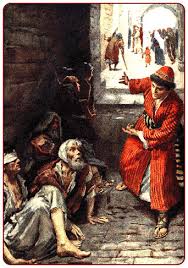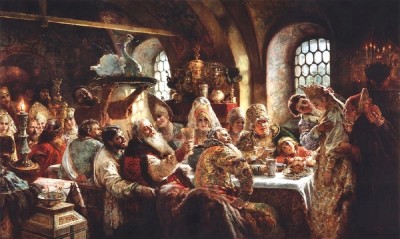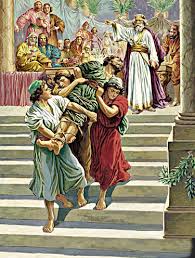
– 15-10-2023-
Gospel Reading: Matthew 22:1-14
vs.1 At that time Jesus said to the chief priests and elders of the people:
vs.2 “The kingdom of heaven may be compared to a king who gave a feast for his son’s wedding.
vs.3 He sent his servants to call those who had been invited, but they would not come.
vs.4Next he sent some more servants,
‘Tell those who have been invited’ he said ‘that I have my banquet all prepared, my oxen and fattened cattle have been slaughtered, everything is ready. Come to the wedding.’
 vs.5 But they were not interested: one went off to his farm, another to his business,
vs.5 But they were not interested: one went off to his farm, another to his business,
vs.6 and the rest seized his servants, maltreated them and killed them.
vs.7 The king was furious. He dispatched his troops, destroyed those murderers and burnt their town.
vs.8 Then he said to his servants,
‘The wedding is ready; but as those who were invited proved to be unworthy,
vs.9 go to the crossroads in the town and invite everyone you can find to the wedding.’
vs.10 So these servants went out on the roads and collected together everyone they could find, bad and good alike; and the wedding hall was filled with guests.
vs.11When the king came in to look at the guests he noticed one man who was not wearing a wedding garment.
vs.12and he said to him,
‘How did you get in here, my friend, without a wedding garment?’ And the man was silent.
vs.13 Then the king said to his attendants,
‘Bind him hand and foot and throw him out into the dark, where there will be weeping and grinding of teeth.
vs.14 For many are called, but few are chosen.”
***************************************************************
We have four commentators available from whom you may wish to choose . Scroll down to the required authors.
Michel DeVerteuil: Lectio Divina with the Sunday Gospels–Year A
Thomas O’Loughlin: Liturgical Resources for the year of Matthew
John Littleton Journeying through the Year of Matthew
Donal Neary S.J. Editor of the Messenger
****************************************
Michel DeVerteuil
Lectio Divina with the Sunday Gospels- Year A
www.columba.ie
General Comments
This passage and last Sunday’s have much in common. They are both parables, each with its own dominant image – the vineyard last Sunday, the wedding feast today. Both belong to the last stage of Jesus’ public ministry and remembering this could be helpful for our meditation. Jesus is in Jerusalem and the atmosphere is tense.
The “chief priests and elders of the people” continue refusing to accept Jesus’ call to conversion; they will soon decide to hand him over to the Romans – a decision which leads to their own destruction. Jesus for his part does not give up. He continues to call them to repentance, although his teaching reflects his frustration at their blindness and hardness of heart.
We can identify similar crisis moments in our lives,
– times when, like the chief priests and elders, we refused to read the danger signs – looking back now, we recognise that we were on the road to ruin, in our spiritual lives, in family or community life, in personal relationships;
– times when, like Jesus, we had to continue calling people to repentance even though we were deeply frustrated at their blindness.
The passage is in three sections:
– Verses 1 to 10 – first part of the parable: the invitation to the wedding feast
– Verses 11 to 13 – second part of the parable: the wedding garment
– Verse 14 – the concluding statement.
As always we are free to take the sections separately or see them as a journey which we make.
Section 1
The image of the parable is of “a king who gave a feast for his son’s wedding”. This is a special kind of feast therefore, one which celebrates the establishment of harmony. The parable therefore evokes a moment when a community (or an individual) is “invited” to make an end of “separateness” and a beginning of “oneness” – within ourselves, in the world and in individual communities.
We think of groups being summoned to live together in harmony
– within families
– in individual countries, e.g. North/South Ireland/Britain, the Basque country, Sri Lanka
– between neighbouring countries, e.g. India and Pakistan, Palestine and Israel
– the different Christian Churches
– the different religions invited to collaborate with each other.
Within ourselves too, a time comes when we must resolve some inner conflict,
– between soul and body
– an ideal and the reality we have to live
– choosing between conflicting relationships.
Very often, as we know from experience, people prefer to remain divided. They are caught up in their own affairs (some to a “farm” and others to a “business”) and reject those who “invite them to the wedding”.
Their rejection takes different forms:
– at first they merely react angrily;
– then they maltreat the messengers, e.g. imprison them as the apartheid regime did to Mandela;
– they go further and put them to death, e.g. Gandhi and Martin Luther King.
We recognise that it is a moment of truth – as it was in the life of Jesus (see above). If the invited guests continue to reject God’s invitation, they will themselves be “destroyed” and their “towns will be burnt”. This is what happened with nationalism in Europe between the World Wars, with British rule in India and with the apartheid regime in S. Africa.
 Our meditation can focus on the “guests” who eventually come in. They are ourselves when we experience a moment of grace in the form of a “wedding”,
Our meditation can focus on the “guests” who eventually come in. They are ourselves when we experience a moment of grace in the form of a “wedding”,
– a family is reunited after long years of squabbling
– an addict is finally converted
– a Church community finds new life through ecumenism or inter-religious collaboration
– warring groups finally make peace.
Surprise is essential to these as to all experiences of grace (cf C.S. Lewis “Surprised by Joy”). Spontaneously we exclaim, “Imagine me being invited to this wedding feast!”
Section 2. This second part of the parable has two characters.
The king represents us when we insist that community (or personal) renewal must bear appropriate fruit. He is indignant at the guest’s attitude and rightly so. As with last week’s passage, what we see is an example of “righteous anger“. We think of national leaders deeply frustrated as they see their newly liberated countries fall into corruption, communal violence, or class warfare.
 The guest is insensitive and uncouth; he has no respect for the occasion or his fellow guests. His basic problem is that he does not feel awe at the privilege conferred on him. Identify with the terrible moment when his arrogance finally catches up with him and he who was to be part of a royal occasion is unceremoniously “thrown out into the dark”, where there is “weeping and grinding of teeth”.
The guest is insensitive and uncouth; he has no respect for the occasion or his fellow guests. His basic problem is that he does not feel awe at the privilege conferred on him. Identify with the terrible moment when his arrogance finally catches up with him and he who was to be part of a royal occasion is unceremoniously “thrown out into the dark”, where there is “weeping and grinding of teeth”.
Section 3 is a fitting conclusion to the parable.
It is a typically enigmatic saying of Jesus which can remain abstract but comes alive if read imaginatively.
The saying reminds us of two stages in renewal. There is a moment of “being called“. We are happy to find ourselves members of a renewed group,
– the post-Vatican II Church with its renewed liturgy, its involvement in the modern world, its active laity;
– a religious community which took the path of true poverty and identifying with the poor;
– a racially integrated society.
A further stage arises when members become complacent and take their blessings for granted. They suddenly realise that they are “not chosen” – they prove unworthy of their “calling”.
Prayer Reflection
“The more universal a work is the more it is divine.” …St Ignatius
Lord, the modern world has become complacent in its individualism.
Every nation looks after its own interests,
one making sure that its farms are giving the highest possible yields,
another that its investments gain more and more profits.
Even the Christian Churches have become individualistic,
each interested in getting more members than the others.
Today you remind us that this is not your plan at all.
You want humanity to be a family, like guests at a wedding party,
happy to be together, swapping stories and laughing at one another’s jokes.
Help us followers of Jesus to be your servants
bringing this good news to our contemporaries.
We know that many, especially the prosperous, will not be interested.
Sometimes we will be maltreated,
and some of us will be killed, and this will result in further violence.
But we know too that many at the crossroads are anxiously waiting to be invited,
and your wedding hall will be filled.
“Without a revolution of the Spirit, the forces which produced the iniquities of the old order will continue to be operative, posing a constant threat to the process of reform and regeneration”. …Auf San Sun Kyi
Lord, the people in many countries of your world are deeply divided
– Tamils and Inhalese in Sri Lanka
– Hindus and Muslims in the Punjab
– Israelis and Palestinians in the Holy Land.
– up to recently, Catholics and Protestants in Northern Ireland
Send them courageous men and women who will summon them to unity,
like the king in the parable sending the servants
to invite guests to the wedding feast of his son.
The people they are sent to will often not be interested.
They will prefer to go off to their farms or to their businesses;
they will maltreat your messengers and sometimes kill them.
Lord, remind your prophets that they must not give up.
Your invitation stands, the banquet is all prepared,
oxen and fattened cattle have been slaughtered.
Though many have proved unworthy
there are men and women at the cross roads of the nation
who want unity and reconciliation;
the wedding hall can yet be filled with guests.
“Only those are truly great who are lifted above themselves by a faith which gives itself entirely.” …Yves Congar
“If today’s flourishing civilizations remain selfishly wrapped up in themselves, they could easily place their highest values in jeopardy; their continued greed will certainly call down upon them the judgement of God and the wrath of the poor, with consequences no one can foretell.” …Pope Paul VI, Populorum Progressio
Lord, we thank you that recent popes have been the voice of Jesus,
warning the nations of the world that if they refuse your invitation to unity they themselves will be destroyed and their towns burnt.
Lord, how quickly we become settled in our ways in our families, communities, including the national community.
We choose not to be involved with others and we do not let others become involved with us.
From time to time you invite us to come out of our isolation
and experience ourselves as part of a sharing community.
You send us messengers:
* someone asks us to help in the church or in the village;
* personal misfortunes or local natural events or international threats make us dependent on our neighbours;
* social problems like drugs or AIDS or unemployment begin to affect us as well.
Forgive us that we get angry with your messengers.
We are so insistent on maintaining our isolation that we maltreat and even kill them.
We look back now and realise that we were only postponing the need for change; if we had continued that way we would have been thrown out into the dark where there would have been gnashing and grinding of teeth.
Lord, forgive us when we take your blessings for granted.
We move around unconcerned, insensitive to the needs of others,
as if people who love us will always be there to excuse and forgive.
We are like a guest going to a wedding reception in old clothes,
not bothering to excuse himself or to thank the hosts for inviting him.
Lord, help us to see the error of our ways before it is too late
and we are bound hand and foot and thrown out into the dark.
Lord, help us always to be humble, remembering that even if we were called – it doesn’t mean we will always be chosen.
*********************************************************
Thomas O’Loughlin
Liturgical Resources for the Year of Matthew
www.columba.ie
Introduction to the Celebration
 Whenever Christians assemble to celebrate there must be a spirit of joyfulness and thanksgiving in our gathering. This is not some jolly optimism that things just might ‘look up’ or that ‘we might be lucky‘ or that maybe ‘the worst won’t happen‘. Our joyfulness is founded on the most basic of our beliefs:
Whenever Christians assemble to celebrate there must be a spirit of joyfulness and thanksgiving in our gathering. This is not some jolly optimism that things just might ‘look up’ or that ‘we might be lucky‘ or that maybe ‘the worst won’t happen‘. Our joyfulness is founded on the most basic of our beliefs:
God is good, God is generous, and God is love. God is greater than our suffering, our wickedness, and he bestows his love with largesse. We experience meanness and limitation, we often act with bitterness and without thought; but God’s mercy is greater than this, and his goodness stands as a beacon at the end of all human existence. Today in the readings we are reminded of this unconditional generosity, this goodness underpinning the universe, this love that forgives us and gathers us here at the Lord’s banquet.
Homily Notes
1. The first thing to say in any homily is to acknowledge that this gospel (and this assumes that you have read the shorter version) presents us with a series of shocking images.
A peeved and angry despot sets out on a spree of murder and mayhem just because he has suffered an insult. It is the behaviour we find shocking when we read of such happenings with dictators today. Why on earth is this being held up to us in the scriptures with the implication that the murderous king is to be equated with God?
There is no easy answer. The most popular solution for most of the twentieth century was to say that there is a fundamental difference between a fable (where every detail is there to be decoded) and a Jewish teacher’s parable: here is a deliberately shocking story designed to draw out just one point: everyone that can be found is invited to the wedding feast. This distinction is not, however, anything like as clearcut as many popular books declare; and, moreover, it is anything but clear that the early churches interpreted these stories in this way. We have to start with this fact (one which is awkward for many): there are parts of the early preaching, as recorded in writing, which we do not understand and which may represent positions that were later excised from the kerygma. This passage is one such case: what it means is a guess, and the task, once it has been read in the liturgy, is to reconcile it with the overall thrust of the gospel.
 2. So, assuming that you have explained that we simply have to guess our way here, let us use this distinction between a fable and a parable. What is ‘the bottom line’? It is this: everyone that can be found is invited to the wedding feast. Why is this such an important message? This is the question that we must focus on, not the details of the parable.
2. So, assuming that you have explained that we simply have to guess our way here, let us use this distinction between a fable and a parable. What is ‘the bottom line’? It is this: everyone that can be found is invited to the wedding feast. Why is this such an important message? This is the question that we must focus on, not the details of the parable.
3. First, the feast is not just for a select group, an exclusive group that are ‘in favour’ with God. God loves everyone.
4. Second, the feast is not just for those who know about it: many will arrive at the feast at the End without realising that they ‘were heading in that direction’. God’s love is greater than groupings.
5. And Third, they are there at the wedding feast because God wants them there, not because we could recognise them as ‘good or bad‘. God’s love is infinitely forgiving. We often think of the call to eternal life backwards. We do not think of it primarily as God sharing his love with us, but as God meetng out retribution to those who ‘should not be let in’ such as Hitler or Stalin or Mao.
6. The banquet of heaven is within the reach of every human being, it is God’s gift, it is not bounded by our boundaries of party or group or church, and his forgiveness is greater than all we can imagine. This is a message that is just as shocking for many as the images of the despot in today’s gospel.
****************************************************************
John Litteton
Journeying through the Year of Matthew
www.Columba.ie
Gospel Reflection
Anyone who has gone to the trouble of organising a party for family and friends will appreciate the work that is involved. Organising invitations, and providing food, drink and entertainment requires much thought. Considerable effort goes into the event.
However, it is all worthwhile when a good time is enjoyed by the guests and they depart expressing their contentment and pleasure. Even if one or two guests fail to  turn up, we can shrug our shoulders and marvel at their bad manners because everyone else had a good time.
turn up, we can shrug our shoulders and marvel at their bad manners because everyone else had a good time.
But imagine if nobody turned up! Think of the disappointment, the embarrassment and the feelings of frustration. Dark thoughts would cross our mind and, no doubt, we would delete these friends from our address book and want nothing more to do with them.
Jesus, who was an excellent teacher, used precisely this scenario to teach his listeners about the Church. The parable of the marriage feast is about the fate that awaits those who either reject his Church or who refuse to use the Church properly to live in God’s grace and to prepare for judgement.
The king in the parable represents God, who invites certain chosen people to the wedding feast. Not only did those invited make excuses and fail to attend but, when they were given a second chance and the king sent other servants to repeat the invitation, those servants were physically assaulted and even murdered. So it is with the Church. People often reject the Church and persecute the followers of Christ.
The parable teaches that a terrible fate awaits those who act against Christ’s Church because, as the king in the parable was angry and sent his armies to destroy the murderers and burn their cities, so will God judge those who refuse to attend the wedding feast that is the Church. All the nourishment required for our souls, all the graces to be received through the sacraments and other spiritual practices, are represented in the parable by the carefully prepared dinner that the king offers freely.
 In the parable, the king eventually managed to fill the venue with people ‘bad and good alike’ (Mt 22:10) and the marriage feast was held. But then the king saw a man who was not wearing a wedding garment and, when he asked for an explanation, the man remained silent. The king’s anger erupted again and the man was bound hands and feet and thrown ‘out into the dark, where there will be weeping and grinding of teeth’ (Mt 22:13).
In the parable, the king eventually managed to fill the venue with people ‘bad and good alike’ (Mt 22:10) and the marriage feast was held. But then the king saw a man who was not wearing a wedding garment and, when he asked for an explanation, the man remained silent. The king’s anger erupted again and the man was bound hands and feet and thrown ‘out into the dark, where there will be weeping and grinding of teeth’ (Mt 22:13).
This appears to be an exaggerated response, out of all proportion to the crime of failing to implement the wedding dress code. But that is not the crime. Jesus used the popular customs and mores of his day to teach eternal truths. This time, he was teaching that not only those who obstinately remain outside his Church will suffer eternal loss of salvation but also those who do not avail of the life in Christ that is offered through the Church.
That is the meaning of the ‘wedding garment’ (Mt 22:12). We know the importance of dressing appropriately for various events and it is embarrassing if we either under dress or over dress for an occasion. The key event for which the Church was founded is to prepare us for our judgement before God. If we appear before the throne of God, having failed to live our Christian vocation, we will face the wrath of the King in the next world. The words of the king in the parable are worthy of frequent reflection: ‘For many are called, but few chosen’ (Mt 22:14).
For Meditation
The kingdom of heaven may be compared to a king who gave a feast for his son’s wedding. (Mt 22:1)

********************************************************
Donal Neary SJ
Gospel Reflections For Sundays Year A
www.messenger.ie/bookshop/
Look to the Heart
There is a big problem with this story. In a good story Jesus always raises a question. It seems a bit unfair to be thrown out, having been brought in at the last minute, because you had no garment. However, the garment means you want to be there and to take on the values of the feast. The garment is the desire of the heart to be a follower in name and deed.
God invites all, but expects us to come with a good heart. Often we see people around mass who seem not to respect it. They may not come often, but God looks to the desires of the heart. Maybe the non-churchy parents who want their child baptised know deep down that their love for the child brings them to baptism. Is that not a good reason? Or maybe the young people who come to mass because they have exams coming up and need all the help they can get?
 While Jesus is totally the inviting one, he wants us to remain with him. The heart that follows is the heart that wants to love, and that desire is the wedding garment.
While Jesus is totally the inviting one, he wants us to remain with him. The heart that follows is the heart that wants to love, and that desire is the wedding garment.
The man knew in his heart that he should not be there. Jesus sees into the heart. What we look for is the sincerity in what brings us to God and that can be different for everybody. Religion is firstly of the heart, and then practice. We never know what’s in the heart of our people who sometimes come in faith. You never can tell! Let God be the judge of that!
Recall a time you felt invited by God to help a neighbour.
Offer that thanks to God now.
Lord, make my heart compassionate like yours.
*******************************